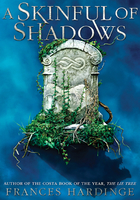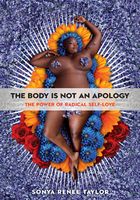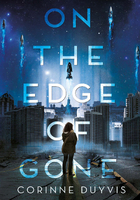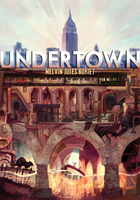Gran rested her hands on Yeats's shoulders. Her words, however, were directed at his parents. "You are being silly—both of you. He is her grandfather, after all. And it is high time we all heard that name again." She stopped Faith's protest. "I know what you are thinking. I understand your fear."
William rose slowly. "Mum, I came here to fix me. This has nothing to do with Yeats."
"How do you know that?"
"Because he wasn't there!"
Yeats appealed to Gran. "I wasn't where?"
She squeezed his shoulders. "Patience." She looked at William. "He needs to know. Look at him! If anyone can help, it is this boy."
"Mum … ," William protested. "We've just stepped in the door."
"And the name that has pierced your heart for twenty years, William … twenty years, has surfaced in that time. You, my son, like Frodo, were wounded indefinitely—in dark circumstances. And you have endured the hurt beyond merit. But now, the time for healing has come."
"Mom?" Yeats whispered.
His mother faced his father. "She's right. Everything she said is right. No more running, William. I am tired. This is it. Do something or changes are coming. I mean it."
Yeats silently cursed himself. Why couldn't he have kept his mouth shut about the girl? Mr. Sutcliff was obviously crazy. If only he hadn't taken the tea to him. Now his mother was ready for a divorce if his father didn't change.
William glanced furtively past the kitchen to the back room. The house had grown peculiarly quiet. The clock ticked loudly, its pendulum swinging like the indecision written on his face. Finally he lifted his chin. He looked at Gran, then at his wife. "All right." Yeats looked up hopefully.
In the garden, there was a loud cracking sound. The echo reached the house. Faith sat bolt upright. "What was that?"
Gran shrugged and then motioned to the dining room table. "It's an old place, Faith, with many sounds. I tune them out most days. Most likely it's the well. It was broken many years ago. Lord knows how many old wishes are still rattling around and trying to get out. More cookies and tea?"
"I remember that well," William said miserably. "It certainly never granted my wish."
They moved to the table in uncomfortable silence.
After refilling the teapot Gran tapped her lap for Odysseus. Yeats regarded his father. Only twenty-four hours ago Yeats had been pleasantly contemplating the eternal month of August. And then his father had sprung a surprise trip, "for a day or two," a car ride to the country. He knew something was wrong; his parents were arguing over something. But the summer sun and the hope of new friends had soothed his worries.
Gran sipped her tea.
Faith patted her son's hand. "Don't worry."
"About what?"
"Just don't worry. And stop scowling."
Gran said to Yeats, "You like stories, don't you?"
He nodded.
"Then I will tell you two stories, for they are very closely attached. Make yourself comfortable."
Yeats settled in his chair. He was used to stories.
"A long time ago, in ancient Arabia, India, China, and Persia, stories were told and written down. They have been told and retold over the centuries and no one is certain of their original versions, much like Grimms' fairy tales. Some of them you have heard before: Aladdin and his lamp? Perhaps even Ali Baba and the Forty Thieves, or Sinbad? You have? Good."
She continued. "But what many children of today do not know is that some of the stories are linked by one: the story of Shaharazad and One Thousand and One Arabian Nights."
William groaned.
Gran said, "Shaharazad was the daughter of the royal adviser, or vizier, to the King. She was both courageous and beautiful—blessed with the extraordinary gift of insight like her father. Her wisdom, however, came into question one day when she put herself in mortal danger to save her people."
Yeats reached for a cookie.
"The King was happy, living in love and wealth. Then one day he was betrayed by his wife and his brother. A terrible madness seized him. Furious, he gripped a spear and hurled it at his brother. The blade missed its target and drove into the heart of his wife. Stricken with grief and anger, the King banished his brother. In the days to come nothing could ease the King's pain. By law he was required to marry again or abdicate the throne. But his heart could not find the courage to trust anyone again."
"What did he do?" Yeats asked.
"He devised a spiteful plan. A dreadful plan. He decided that he would marry again, according to the laws of the land, but that this time he would kill his bride on their wedding night."
"Not exactly fair, is it?" Yeats said. "And how would that keep him married? If he killed her, he wouldn't be married anymore."
"Right you are. But if the King took a different girl each night …"
"He killed one each night?"
Gran nodded. "He did. When Shaharazad heard of this she immediately offered to be the King's bride."
"So, she was crazy as well as beautiful?"
Faith rested her face in her hands. "Shhh. Listen, Yeats."
"Oh, she wasn't crazy," Gran assured him. "She had a plan. Her father tried to dissuade her. As the royal vizier he knew the volatile condition of the King better than anyone. But his daughter was persuasive. It wasn't long before she married the King."
"And he killed her?" Yeats asked.
"On the wedding night, the King told Shaharazad that it was time for her to die. But, wise girl that she was, she answered, 'Come, my lord, you are tired and ill at ease. Let me tell you a story to calm your mind.' The King did not know what to do with this proposal, so he answered, 'If your story allows me to sleep peacefully without the nightmares that plague me, I will let you live another day.' And it did. For the girl had studied the poets and stories of many countries and could tell a tale like no one else. Story after story she told, night after night, calming the King, until a thousand and one nights had passed."
Odysseus purred loudly.
"Then what happened?"
"Ah," said Gran. "The King dealt with his brother, through battle, and he finally gave his trust to his queen. The story ends with Shaharazad telling the King's story to their own children."
"So she lived?" Yeats asked.
"She did. And she became an Eastern heroine of the highest standing."
Yeats thought again of the old man upstairs. "What does all that have to do with Dad?"
William cleared his throat. His eyes shifted again to the back room. "Over twenty years ago," he began, "when I was your age, a girl came to live with us. Her parents had died a year or two before in a car accident, and her grandfather, Mr. Sutcliff, asked if she could stay."
Gran said, "I've known the Sutcliffs all my life. I couldn't turn them down."
"Her name … ," William continued, "… was Shaharazad."
"Shaharazad," Yeats whispered.
"Indeed. Though we all called her Shari. That's her there." He nodded to a picture.
A shapely face, white teeth, long black hair. Her eyes challenged.
"She's pretty," Yeats said.
"Yes," his father murmured. "I never noticed. We were too busy having adventures. Her mother was Persian." Yeats nodded and continued to look at the photograph. The girl had dusky skin and sculpted eyebrows. Her hands, resting on her lap, were both delicate and clever.
"And she was well named," Gran added. "Just like Shaharazad she lived with tragedy around her. And yet she hunted for ways to help the family through troubled times. A Persian princess." She sighed. "She was entranced by the story of the Arabian Nights. She so wanted to turn a sad story into a happy one."
William unclenched his fists. "Shari and I became good friends. This house and the land around it were our playground. The creek, the woods …"
"The library," Gran interrupted.
"Everywhere," William hurried on. "Shari was wild—adventurous isn't even the right word—fearless is better. She wanted to save the world. She combed these woods looking for things to save. We rescued a kitten from a rotten tree, mice that had lost their mother, anything that breathed and needed saving." He suddenly stopped speaking and loosened his shirt collar. He removed a necklace crafted of worn leather. Two objects hung in the middle: a clear marble with a hole through its middle and a tiny silver bell. It gave a faint tinkle as he laid it in Yeats's hand.
For as long as he could remember, his father had worn the necklace regardless of whether he was dressed formally or casually. When Yeats was a toddler he would play with the necklace until asked to give it back. It was always a treat to be allowed to hold it.
His father pressed the marble and bell into Yeats's hand. For the briefest moment, the other people in the room faded. His father spoke with clarity and certainty.
"There," he said. "That's better. I believe with all my heart that you will be safer with that in your possession. Don't lose it."
"I won't," Yeats answered. "Thanks, Dad."
"Well, that's a first," said Faith. "That's been your good-luck charm for as long we've been married. Never thought I'd see the day."
"I remember the bell," said Gran. "It was Shari's."
Yeats slipped the necklace around his neck. The marble was cool against his skin. He felt a little embarrassed by all the attention.
"Yes, it was," his father murmured. The thought returned him to the story. "One day, Shari and I were in the back room. Mum—your gran—was out. We were reading some of the books in the library. …"
"One of the books," Gran corrected.
"One of the books—the Arabian Nights. There were several versions in the library and Shari insisted that we read them all. Something strange happened then, although what it was, I don't exactly remember."
"What do you mean?" Yeats asked.
His father stood up. "Have you got any beer, Mum?"
"No."
"Wine?"
"There's a flask of Scotch on the second shelf to your left. I keep it for Mr. Sutcliff's nightcaps. Don't spill, please. Odysseus likes it too."
Yeats toyed with the necklace at his throat. He had never seen his father drink before. His mother said nothing but was clearly agitated. One more nail in the coffin, Yeats thought. He had to do something, but he was trapped in this room.
William sat down again, this time with a shot glass. He shuddered as he drained the golden liquid. "Shari was taken away," he gasped.
"While reading Collfield's unexpurgated version of the Arabian Nights," Gran interrupted. "Why do you keep avoiding the facts?"
William's eyes had glazed over. "They took Shari." He looked at his son. "It nearly brought me over the edge. I can hardly remember anything. It sent Mr. Sutcliff mad."
Gran swirled her tea wrathfully. "He's not mad. That's the easy way out. This was not an everyday occurrence! Her abductors came from a special place. You know what I mean."
William stammered, "I had to return, Yeats, to see where it all happened, for the hope of closure."
There was a long pause.
Faith's frown turned into an astonished "oh." "You've always said this story was a dream. I assumed what really happened was buried underneath your grief. What are you trying to say, William?"
Gran fidgeted. "That's all, William? That's all you're going to say?"
"For now."
"May I add to it?"
"Not yet, Mum. Please, we haven't been here an hour."
Odysseus stretched luxuriously.
"Do you think, William," Gran said, and peered at him sagely, "that more time will ease the facts? While time may be a healer, inaction most definitely is not. Your story leaves unsatisfying, gaping holes."
William turned to Yeats, and father and son regarded each other.
"I don't need to know," Yeats assured him, "unless it helps."
"I'll start by talking to Mr. Sutcliff," his father said. "That's as good a place as any."
Gran raised her eyebrows. "Everything starts with a story, my boy. Even poems. I thought you could start at the beginning."
"That's why I'll go to Mr. Sutcliff, Mum."
Gran shook her head. "You and a missing girl are the beginning. I've lived my life without knowing the secrets of this house. At least, not all of them. We must start with what you can remember. And that may take some digging!"
"What secrets?" Yeats asked. His skin prickled.
Patting the wall, Gran said, "This home has an extraordinary history, my boy."
"Don't, Mum," William pleaded.
"Why not? It is Yeats's history too. Besides, I promised him two stories. And now, for the second tale, and one that is closer to his heart than he knows." She ran her finger lovingly along the oak window ledge. "Your great-great-grandfather Philip Walter Trafford was a collector of sorts. His antiques were rather unusual."
"How?" Yeats asked.
"Well, they were …" She waved her hand, fishing for the right word. "Ancient. Connected to literature in some way and …"
"Yes?" Yeats encouraged.
Gran leaned forward. "Magical."
Yeats raised his eyebrows.
His mother snorted. "If it wasn't so absurd I might be amused. Doesn't sound very scientific."
"And so you have been brought up to believe," Gran said. "Science is so limiting when it is the only lens you use." Before Faith could reply, Gran added, "Grandpa Trafford did not share your faith in science. Oh, he loved chemistry and the apothecary arts to be sure. But he also understood their source."
"What do you mean?" said Yeats after an uncomfortable silence.
"Good!" Gran tapped Yeats's hand. "That is proper science. Clarify the terms so that we can understand one another better. Magic is what we are talking about. Not the silly kind found at a country fair with tricks and gimmicks. No—your great-great-grandfather was interested in something deeper. Something so grand the ancients could only express it through anthropomorphism, gods and goddesses, through Muses and inspiration."
Gran indicated the room with the closed door. "There are some very old books in the library, from a time when people did not rely on science as they do these days." She nodded knowingly. "Grandfather Trafford loved the great books of literature. He said they were the best reminders of the first and greatest act of inspiration."
"And what was that?" asked Yeats.
Gran raised her eyebrow. "Creation."
Yeats looked from one adult to another. His father's face was drawn tightly, not with skepticism but with concern. His mother looked at the floor, smirking. Gran stared back at him unblinkingly.
"Oh," said Yeats.
Gran continued. "Your great-great-grandfather collected as many of the greatest works as he could. Paintings, sculptures, antiques of all kinds, even a pair of bookends made by a Dutch sculptor."
"Bookends," William repeated. "I remember those."
"Mr. Sutcliff believes the bookends are the key," Gran said. "Which is why I mentioned them."
Yeats gaped at his father, then at Gran. His mother spoke for him.
"You're not serious? I know the house is weird, but please!" She appealed to William. "You said that you and Shari had wild imaginations, that perhaps …" She checked herself when she saw her son's face. "Yeats? Would you go outside for a few minutes? Apparently I've been excluded from some important conversations." She glared at his father. "I want some clarity before we go any further. Perhaps Yeats could take Odysseus for a stroll?"
Yeats looked at his father, who nodded. Gran frowned but lifted her arms to allow Odysseus to jump down from her lap.
"Don't touch anything," Faith warned.
"Touch whatever you want," Gran countered.
"The house isn't safe, Mum," William said.
"Life isn't safe, William."
As he made for the door, his father suddenly grabbed his wrist. A line of sweat trickled down his face. "Don't take off that necklace, Yeats! It's important. Promise me!"
"I won't, Dad. I promise. And promise me you won't drink anymore when you're upset."
His father squeezed his eyes shut. "Never again, son. You have my word. Tastes awful anyway." They shared a rare, brief smile.
Before the door closed behind him he heard his mother say, "You're scaring him, both of you! I've had enough of all this."
Yeats bit his nails as he plodded into the garden. The weekend could hardly be going worse. And now, banished outside, he couldn't even be a referee between his mother and father. He longed to be home, or anywhere else. But there was no getting away. His father's depression would come and go like clouds extinguishing the sun, following their family forever. The endless counseling sessions had not worked. The antidepressant drugs had failed. His mother and father were in the worst fight of his life. His mother was at her wit's end. And how could he blame her after what he had just heard?
Magic? Yeats sat heavily on a garden stone and covered his face. His heart thumped. His worst fears rose up like ghastly shadows and darkened his thoughts. His family would break apart for sure now. He could still hear his mother's skeptical voice.
His heart skipped again as another fear rushed over him. What Yeats had always believed was that his father suffered from a treatable depression. Now he saw it as something far deeper: his father was losing his mind. It was obvious. He acted childlike around Gran. He broke out in a sweat at the mere mention of Shari. Like old Mr. Sutcliff, his father was overwhelmed by tragedy and was slowly falling from reason. How long before he stopped cutting his hair and rang a bell for his tea? What would they do if his father lost his job at the university? Where would they go? Would he and his mother leave to let his father wallow in madness?
A tear squeezed out. It wasn't fair! Things were going well. Their house was in the middle of the street surrounded by kids his age and his school only a short distance away. Why did this have to happen now?
Yeats rubbed his eyes as a last specter loomed. Perhaps insanity ran in the family! His father, and now he learned his great-great-grandfather, were both completely loopy. Maybe it was only a matter of time before Yeats went mad as well. He saw his father's face again, white and sweating.
And then his mother's words echoed in his memory. Your father is brilliant, Yeats. Don't let his gloomy clouds fool you. You have a right to be proud. I married an intelligent, kind, and handsome man. And our son is too. She had not said anything like that for a long time.
Taking a breath, he looked around. He needed something to focus on, something to break up the adult banter and worrisome thoughts in his head. Gran's garden spread out in front of him.
Gran. What a character. And, yet, there was something comforting about her too. It felt good to have her hands on his shoulders. How could someone so strong, so clear, be caught up in a conversation about magic?
He glanced over the yard to where the fountain gaped open. With nothing better to do he made for it via an overgrown trail. Vines and mysterious shrubs spilled their dew on his jeans as he passed. Burrs scratched his T-shirt and he had to leap over a wicked little thorny bush.
He nearly banged into an old well but caught himself at the last moment. He put his hands on either side of the opening and peered into the darkness of the hole. The air rising from the deep was cool and damp. "Gran's old wishing well," he murmured, and the words echoed quietly back to him.
The mouth of the well looked rather grubby, with mottled lichens covering the inside as far as he could see. Despite his somber mood he grinned, for he realized his father might have stared down the same hole some twenty years before.
And then his frown returned. His father had said that his wish had not been granted. What did he mean? Was he alone at the time or was the girl with him? His frown deepened. Perhaps his father had wished for the girl to come back. Yeats leaned a little deeper into the well mouth. If that was the case, then the well was truly broken.
"I wish I knew what was going on," he added, more loudly than he had intended.
The moment his words were out he felt a tremor in his fingers, a ripple that stemmed from the cool stone and rattled up through his elbows. He felt the stones shake beneath his feet. From deep below came an ominous moan. His eyes widened, but he didn't let go of the fountain.
The moaning grew louder. Yeats caught his breath when he heard a voice. It sounded like a boy.
Yeats tightened his grip. "Stay calm. It must be my echo," he assured himself. But the tone was different. It didn't sound exactly like his. And there was desperation in the voice. He could have sworn he heard someone say, "I wish! I wish!"
"Is anyone down there?" he asked experimentally. When there was no answer he took a deep breath. He squeezed his eyes shut and tried to think through the moans and trembling stones. He had said the words I wish, hadn't he? Perhaps the length or depth of the well tunnel could change the echo so that it sounded like someone else.
And then an idea popped into his head. It was a memory of standing at the state capitol fountain. His mother had said, "Make a wish, Yeats!" He remembered throwing something into the water.
Yeats let go of the well and dug into his pocket. He pulled out a penny. He held the coin briefly above the opening and then dropped it into the darkness. There was no splash or even so much as a tinkle. But the moan died instantly. The stones stopped shaking. There was complete silence for a moment. A crow cried raucously from a nearby tree.
"Weird," he murmured.
And then it happened. There was a muffled boom from below. Suddenly the ground began to shake so violently that Yeats was flung across the yawning mouth. His cheek scrunched against the stone. He fought blindly for a grip. His stomach dipped into the emptiness.
There was a succession of tiny low sounds and he felt pressure against his chest. Something was coming up the well. A second later the wind struck. It hit him like a gale, ripped his hands free, and blasted him into the bushes.
Dazed, he stared back at the well. From the wind a voice cried out, "I wish, I wish!" echoing a thousand times over. Tree branches blew straight up and leaves and twigs hurtled skyward in the volcanic debris.
Several of the stone slabs on the well mouth shook loose from their mortar and fell with a crash into the depths. The noise and wind stopped as suddenly as it had begun. A moment later the ground stopped shaking. Yeats stood slowly. The garden was quiet again, although, he noted, there were no birds chirping. Not after such a blast.
"Wow," he murmured softly. He stepped cautiously to the well and touched the cold stone with a quaking finger. Nothing happened. The well itself was now completely broken. It had gaping holes in the sides and the mouth was clogged with debris.
He was about to peer more closely when a sound caused him to turn his head toward the fountain. Only steps away, one of the tiles on the ground rocked on its edge, the scrape of stone on stone unmistakable in the silent garden. Then the movement stopped.
Yeats knelt and glanced around, wondering if Odysseus kept any feline company. But the cat was nowhere in sight. And no wonder. After the well's volcanic eruption he wouldn't wonder if Odysseus was attached to some tree trunk. "The well must have done this," he said. "Shaking up the ground and breaking the tiles with all its rumbling. I wonder if there is volcanic activity in the area?" The thought was somehow comforting in comparison to any mysterious alternatives. He sighed. It was just an earthquake. He glanced toward the house. Mom and Dad! They must have felt the earthquake too.
When no one rushed from the house, Yeats turned back to the tile. His hands were shaking. "Get a grip, Yeats," he scolded himself. "There's a simple explanation."
He gave the leaning tile a poke with his finger. Then he turned to the fountain. Some of it was blocked from view by vines and moss. The vegetation tore away easily after a few good tugs. He could see a basin now, and part of a pedestal. When a larger patch of moss broke free in his hands he suddenly came face-to-face with a gargoyle.
He fell backward, nearly landing on the broken tile. The leering face of the gargoyle was alarmingly close. He breathed a sigh of relief. It was only stone.
There was some writing cut into the smooth plane of the lip of the hideous face. The script was Gothic—hardly readable—and it trailed from one end of the creature's mouth to the other.
"'Come away, O human child,'" Yeats read. He scrambled to his knees. Scrubbing at the tree- and dirt-stained words with his sleeve, he uncovered more. "'To the waters and the wild. With a faery, hand in hand. For the world's more full of weeping than you can understand.'"
The scraping sound started up again, and Yeats turned quickly. He could see the broken tile better now and stretched out his hand to lift it. At the last second he retreated.
Can you, Yeats? Dare you, I wonder? Mr. Sutcliff's words echoed. Peering over the brush, Yeats saw Odysseus sitting up. Their eyes locked.
"I'm not scared, you know," Yeats challenged. The cat looked away.
The tile in the dirt was a thick slab of stone. Yeats prodded the raised edge. The stone scraped and ground as it leaned on its axis.
"There is something in there." Sunlight, miraculously finding a way through Gran's wilderness, glinted off an object in the dirt.
Don't touch anything!
Touch anything you want!
"I hope it's not bones." He imagined Hamlet, stooped at the grave, holding the jester's skull—something he'd seen in his dad's books. As he dug something poked his finger. A drop of blood dripped off his finger onto the earth.
There was something solid there, something metal. It had rounded edges and was not much longer than his hand.
The cat padded over stealthily, like a panther on the hunt. Yeats moved aside to let him sniff. The slab was too heavy for Odysseus. A second later his hackles were up and he hissed. Then abruptly he began to wash his leg.
Yeats stared from the cat to the hole, half expecting something to come out.
The sun disappeared behind clouds and the overhanging brush. Odysseus started on his second leg.
"What's wrong with you? You hiss, then you wash. You're a lot of help."
The object was heavy. It lay on a bed of earth, hastily scooped, for it only just fit the hole. After several tugs it slid out.
"A pirate!" Yeats exclaimed. It had a sea hat and cape, a cocky stance, one foot on a treasure chest and a sword in hand. A skull and crossbones grinned at Yeats from its hat. He turned the figure around. The fold of the cape provided a flat backing, as did the outflung sword arm. The elbow was worn.
"A bronze bookend," Yeats said. Odd—his father had just mentioned bookends. He wondered if there was a connection. He felt the hole for another bookend but it contained no further treasures. "You must be one of Grandfather Trafford's antiques," Yeats told the pirate. He turned the bookend over and read the words embossed on the back. "Gift House, New York. Eighteen twenty-six." He brushed off the soil as the first drops of rain fell. "Let's take you inside, Captain."
The kitchen was empty. Hefting the bookend, he paused. From the hallway leading to the stairs he thought he heard his mother, although the tricky nature of the house made him uncertain. He stood undecided between the kitchen and the hall.
Odysseus gave a yowl.
Yeats saw it too. The door to the back room was ajar. "Dad?" he murmured. The pirate suddenly grew very heavy as he approached the door. He almost dropped it.
"You see that?" Yeats whispered. The cat curled around his legs, tugging. "All right, all right. Don't have a fur ball. We'll have a look."
Odysseus slipped into the gloom.
"Wait!" Yeats leaned against the door frame, undecided. Other than the steady rhythm of a clock the room was quiet.
"Pssssst, pssssst," he called. "Odysseus! Come here." His blood pounded in an ominous rhythm. A bookshelf inconveniently blocked further view into the room. Papers scattered inside and Yeats jumped back. The pirate's head smacked the door frame.
"Stupid cat's made a mess. And they're going to think I did it." With a last look at the kitchen Yeats stepped into the gloom.















